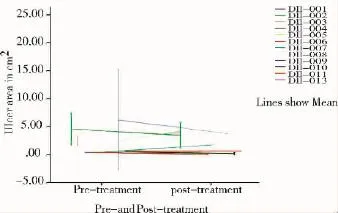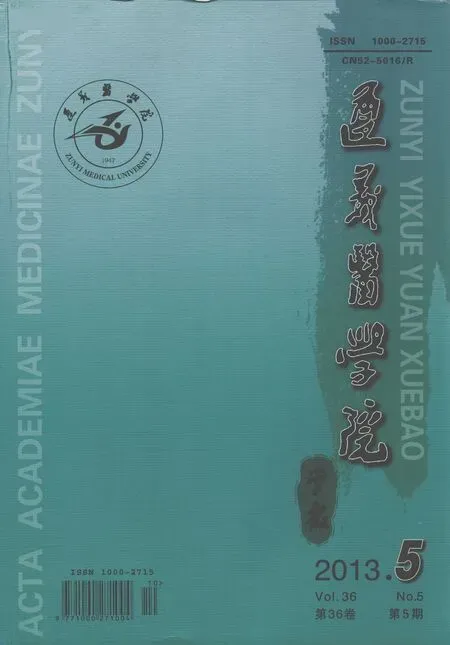中药复方治疗慢性难愈性溃疡
——非随机对照临床预试验*
梁秉中,何景文,陈宝德,陸乃明,卢泳文,郭海蒂,黄丽仪,郑景辉
(1.香港中文大学中医中药研究所;2.香港政府卫生署社會衞生科;3.香港中文大学医学院 内科及药物治疗系皮肤病研究中心;4.香港威尔斯亲王医院足病治疗科;5.香港中文大学公共卫生学院)
When a chronic ulcer fails to heal,the longer it exists,the more difficulty of the treatment would be expected.Causes of the failure to heal include deformities in the foot,loss of sensation,and bacterial infections.Known situations of non-healing ulcers of long durations thus occurs among elderly patients suffering from leprosy,diabetes and venous stasis.Such patients usually have received surgery including skin grafting and plastic repair,yet failed to achieve healing.
We have previously reported the favorable results of chronic ulcer treatment using a herbal formula of Chinese Medicine in patients suffering from type 2 diabetes and persistent foot ulcers[1-2].With limited surgical interventions such as limited toe amputations and ulcer debridement,we managed to avoid major amputation in 80% of patientsoriginally scheduled for such intervention unless the ulcer was healed.
Basing on this good experience,we have worked out in the laboratory the biological activities of the herbs on the promotion of tissue healing.The herbs mainly act on the control of inflammation and promotion of granulation formation through stimulation of fibroblast proliferation[3-4].
We therefore planned to offer treatments to a small group of patients who suffered from chronic ulcers for average three years using the same herbal formula.These patients and their attending physicians lost confidence in surgery or medications and held a pessimistic view that the ulcers would be never healed.They therefore accept the alternative treatment using herbal extracts.
1 Materials and methods
1.1 The patients Totally,twelve patients(male 9,female 3)were recruited for the pilot study.The average age was 66 years old.The patients were referred from the podiatrist,leprosy clinic and community nurses.The duration of chronic ulcer varied from 8 to 520 weeks,average 172 weeks(3.3 years).The causes of chronic ulcer included venous stasis(2 cases),diabetes(9 cases),and diabetes with leprosy(1 case).-All ulcers had failed to heal with standard therapy.

Table 1 Baseline characteristics

Table 2 The changes of individual ulcer sizes,duration of ulcer existence and TNF-α
1.2 Methods This pilot study was designed as a non-randomized,single centre,open - label,and single arm cohort study to assess the progress of ulcer healing among the patients with the failure of all attempted active treatments in the past years.All patients took the herbal treatment being offered as the test resort for possible healing.They did not agree for placebo assignment in a more sophisticated clinical trial.Proper ethical approval was obtained by the Hospital Ethical Committee.Exclusion criteria included pregnancy,spreading infection or cancerous changes.
The study medication consisted of two herbs,viz.Radix Rehmanniae and Radix Astragali.The herbs,in the assigned proportions were boiled together in water in the standard way to produce a broth which was hydrolyzed into standard granules(5 gm per sachet)ready to be made into a drink for consumption.Patients were given the herbal medicine with a daily regimen of 2 sachets(5 g/sachet),one in the morning and one in the evening for a total of 6 months.
The study medication was produced by a GMP standard Traditional Chinese Medicine(TCM)manufacturer.
The duration oftreatmentoffered was six months.Follow -up visits were offered every month when the treatment terminated,the healing rate would be revealed,irrespective of whether complete or incomplete healing occurred.This healing rate was taken as the primary outcome.
The medical history showed that the patients’liver and renal functions were stable before entered the pilot study.Ulcer size was measured by placing a ruler on the surface at the widest part of the long axis,and again at the widest part of the short axis.To assess the inflammatory state of the patients with chronic ulcers,the serum expression of TNF-α and C-creative protein(CRP)were measured before the start of herbal treatment and at the end of the 6 months of treatment,or at the visit when the healing ulcer was discovered.The TNF-α data were taken as secondary outcome.During the treatment period,patients received the standard wound care at out-patient clinics and any regular medications related to diabetes,cardio-vascular control etc.
Standard treatment was given to each patient,according to what they were using before they were recruited.The ulcers were cleaned daily with antiseptic solution(Chlorhexidine 0.05%).
1.3 Statistical analysis Data were presented a means± standard deviations(SD).Efficacy data was performed by using Paired t-test or Mann-Whitney Test to compare the changes between pre-and post- treatment.Statistical analyses were performed using SPSS for windows,release 16.0(SPSS.Inc).P-values <0.05(2-sided test)were considered statistically significant.
2 Results
The pilot study included 12 patients with a total of 18 ulcers.All the patients satisfied the criteria for inclusion:over 18 years of age with a chronic cutaneous ulcer resulting from causes like,venous stasis,leprosy,diabetes or arterial diseases.All showed positive responses after the herbal treatment.The mean ulcer area(cm2)of patients at each visit was shown in Table 1~2 and Fig 1.

Fig 1 Wound area(cm2)changes after treatment
On completion of the 6 months’treatment,the overall decrease in ulcer area was 51%compared with the baseline(P=0.04)(Table 3,Fig 2).The average healing time for the 7 healed ulcers was 89 days(Table 4).Totally there were 15 wounds of the recruited Subjects.7 wounds were healed The healing rate was 47%.One typical Case DII-011 with diabetics and leprosy the ulcer existed more than 20 years,after 6 -month treatment,the ulcer was healed.

Table 3 Changes of ulcer area

Fig 2 Ulcer area changes pre- and post-treatment comparison

Table 4 Onset ulcer size and healing time of healed ulcer
The TNF-α level was significantly reduced after treatment or healing of ulcer compared with the baseline(P=0.001),the CRP levels tended to decrease 27%,but was not significantly altered post-treatment(Table 5,Fig 3).

Table 5 Changes of TNF-α and CRP

Fig 3 Change of TNF-α pre- and post-treatment(P=0.001)
The patient(Subject No.DII-011,male,86 years old)with diabetes and leprosy suffered from chronic ulcer over 20 years.

Table 6 Healing status of individual healed ulcers
During study period no adverse reactions related the study medication were reported.
3 Discussion
Patients suffered from chronic ulcer remains a challenging problem in medicine,society and economy.Many patients with ulcers do not heal and become chronic.The longer the ulcer existed,the greater the possibility that the patients developed serious infection that could lead to hospitalization and possible amputation[5].
Chronic ulcers arising from pathologies of neuropathy and repeated infection fail to heal when the predisposing causes hinder the control of inflammation,block granulation formation and promote infection.Our herbal formula works as a supplement to control inflammation which has been well expressed in the marked drop in TNF-α level.Radix Rehmanniae has been shown to greatly facilitate fibroblast proliferation in our laboratory and also in some other studies[3-4,6].Astragalus is well known for its immunomodulating effects.
For those cases recruited under our present cohort study that yet failed to heal completely at the end of the six months of assigned treatment,the herbal drink was discontinued but topical application of the herbal powder(Radix Rehmanniae)was used so as to acquire more information about the outcome of topical use.Results will be discussed in a separate report.
In order to promote tissue healing,attempts have been made on the use of various growth factors.The results had not been totally satisfactory because of the protein nature of the agents making oral and longtermed administration unfavorable.For chronic ulcers with long years of existence,one expects a slow progress of healing and patience is required for both clinicians and patients.Our herbal formula works as a supplement that initiates a slow control of the adverse mechanisms affecting the ulcer healing[7-8].
Although the active ingredients in the herbal formula was unknown and the mechanism of action was not clear,the decline of TNF-α after treatment demonstrated in the chronic ulcer patients indicated that the inflammatory process were under steady control.The fact that the patients taking the herbal supplement experienced a greater decline in TNF-α,which might be a good evidence showing the adjuvant herbal therapy might be working through an anti-inflammatory pathway[9-10].Usually the reduction in CRP level may indicate the facilitation of wound healing by inhibiting inflammation[11].The present pilot study also showed this trend,however,it did not reach the statistical significance.
The simple combinations of the two herbs have demonstrated good supportive effects on the proliferation of cell cultures.It might be logical,as a next step towards the further development of this ulcer healing agent,to try applying the powder form topically to initiate healing effects.Like all other researches on herbal medicine,we have started the bioguided chemical analysis of the combined extract to identify a sub-fraction that might be most efficacious when used either topically or systematically.
In conclusion,the studied herbal medicine has been shown in this pilot study to be safe and effective for the treatment of chronic ulcers.However,a further clinical study with proper sample size is needed to verify the efficacy and investigate its action mechanisms.
[1]Margaret W N Wong,P C Leung,W C Wong.Limb salvage in extensive diabeticfootulceration—a preliminaryclinical study using simpledebridement and herbal drinks[J].H K M J,2001,7:403 -407.
[2]P C Leung,Margaret W N Wong,W C Wong.Limb salvage in extensive diabetic foot ulceration:an extended study using a herbal supplement[J].Hong Kong Med J,2008,14:29 -33.
[3]T W Lau,D S Sahota,C H Lau,et al.Leung.An in vivo Investigation on the Wound-HealingEffect of Two Medicinal Herbs Using an AnimalModel with Foot Ulcer[J].EurSurg Res,2008,41:15 -23.
[4]T W Lau ,Y W Chan ,C P Lau,et al.Investigation of the Effects of Chinese Medicineon Fibroblast Viability:Implications in WoundHealing[J].Phytother Res,2007,21:938-947.
[5]Reiber G E,Boyko E J,Smith D G:Lowerextremity foot ulcers and amputations indiabetics.In Diabetes in America.2nd ed[M].Harris MI,Cowie C,Stern MP,Eds.NIHPublications,1995,95,468.
[6]Jacqueline Chor Wing Tam,Kit Man Lau,CheukLun Liu,et al.The in vivo and in vitro diabetic wound healing effects of a 2-herb formula and itsmechanisms of action[J].Journal of Ethnopharmacology,2011,134:831 -838.
[7]Masoompour S M,Bagheri M H,BorhaniHaghighi A,et al.Effect of ANGIPARSTMa new herbal drug on diabetic foot ulcer:A phase 2 clinical study[J].DARU,2008,16(Suppl1):31-34.
[8]Larijani B,Heshmat R,Bahrami A,et al.Effects of intravenous Semelil(ANGIPARSTM)on diabetic foot ulcershealing:A multicenter clinical trial[J].DARU,2008,16(Suppl1):35-40.
[9]Goren I,Muller E,Schiefelbein D,et al.Systemic anti-TNF-alpha treatment restores diabetes-impaired skin repair inob/ob mice by inactivation of marcophages[J].Journal of Investigative Dermatology,2007,127(9):2259-2267.
[10]Lee R H,Efron D T,Tantry U,et al.Inhibitionof tumor necrosis factor-alpha attenuates wound breaking strength inrats[J].Wound Repair and Regeneration ,2000,8(6):547-553.

